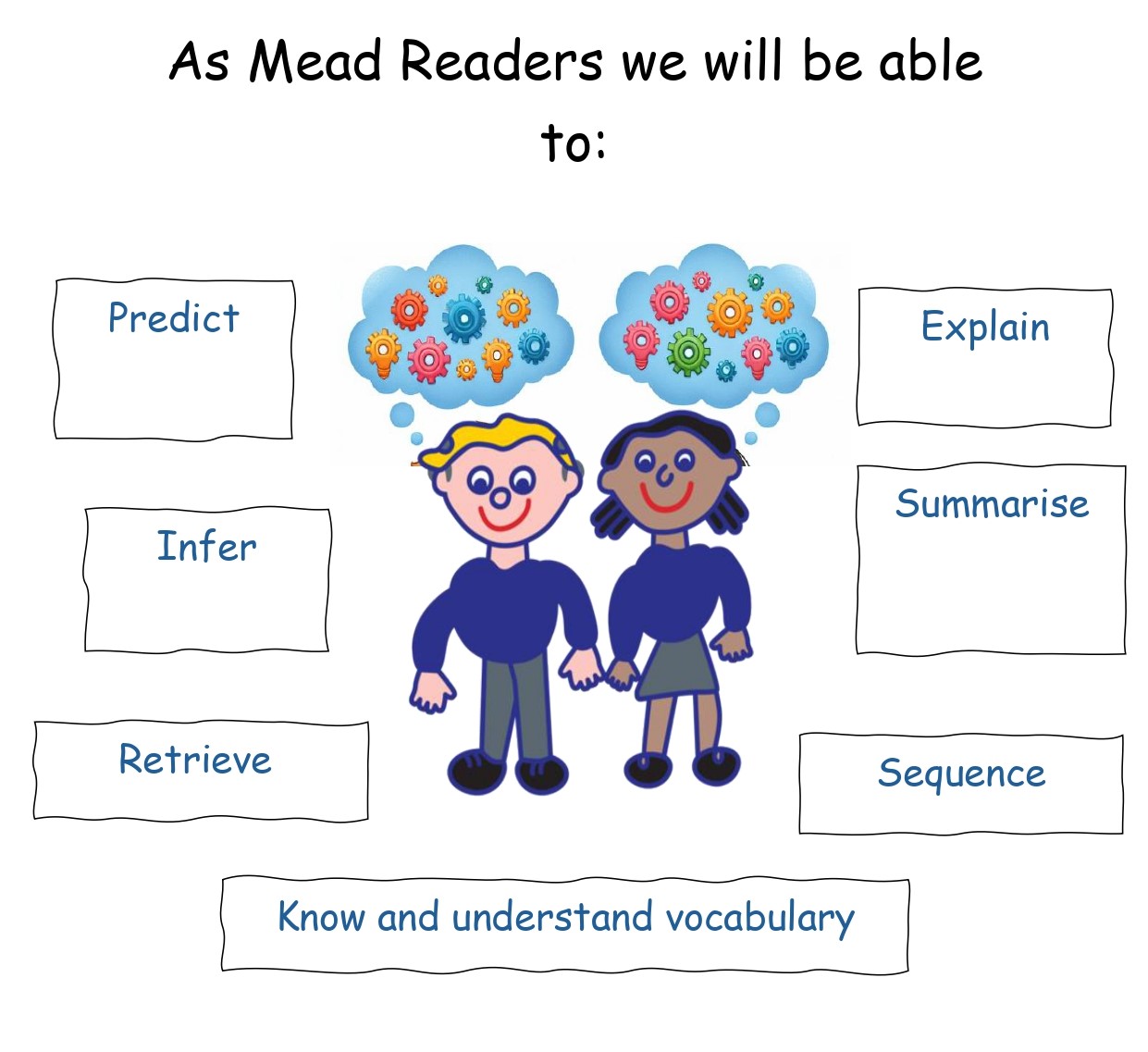Reading
Reading
"The more that you read, the more things you will know."
" The more you will learn, the more places you'll go"
Dr Seuss
Intent
 At The Mead Infant and Nursery School, we prioritise the teaching of reading both as a key component of our English provision and one which unlocks opportunity in all other subjects. Our intent is to develop positive attitudes towards reading, so every child thinks of themselves as a reader and has fostered a love of the written word in all its various forms. We wish to create a community of readers that share, enjoy and promote reading as a skill and desirable pastime.
At The Mead Infant and Nursery School, we prioritise the teaching of reading both as a key component of our English provision and one which unlocks opportunity in all other subjects. Our intent is to develop positive attitudes towards reading, so every child thinks of themselves as a reader and has fostered a love of the written word in all its various forms. We wish to create a community of readers that share, enjoy and promote reading as a skill and desirable pastime.
Implementation
Our English lessons develop pupils’ spoken language, reading, writing and vocabulary. Literacy is taught in a cross-curricular way, linking up with other areas of the curriculum. We teach our pupils to speak clearly, to convey their ideas fluently and confidently and to ask questions. Their vocabulary is developed systematically.
Our reading lessons are delivered through whole class shared reading comprehension sessions with a focus on VIPERS, daily fluency lessons, 1:1 reading, as well as through discreet phonics teaching. All classes have stories read to them every day, which helps to promote a love of reading and something that should be valued and treasured. We aim to read a range of text types, including fiction, non-fiction and poetry. We regularly update our stock of books in the library and class book-corners, ensuring that a balance of fiction, non-fiction and poetry is on offer to our children. Children are able to take a book of their choice from the library to enjoy reading at home.
We ensure that readers of all abilities are presented with texts that are challenging for them and allow them to apply the reading skills that they have learnt. Children choose a school reading book linked to the phonic phases to read in their 1:1 reading sessions and at home. These books are all available in each classroom and children can change their books as often as needed. We have a range of reading scheme books (Oxford Reading Tree, Oxford University Press, Collins Big Cat) which are organised into Phases to match the teaching of our phonics programme.
We greatly value parent contributions to reading, and we offer parent workshops that enable our parents to learn how to support their children at home and to help them understand how we teach phonics. Parents are also invited into the classrooms to share books with their children.
Phonics
At The Mead Infant and Nursery School, we follow the phonic programme Little Wandle Letters and Sounds across the EYFS and Key Stage One.
It is our intent, through our high-quality phonics teaching, that all children will have good phonic knowledge, understanding and skills so that they can decode words confidently and engage with higher order reading and writing skills.
Planning for phonics will be done separately from English but with the understanding that good phonics teaching should link to the literacy needs of the children within an English lesson and across the curriculum.
How do we pronounce phonic sounds?
In resources, you will find some useful videos which show you how to pronounce all the sounds in phase 2 and phase 3 phonics. When your child progresses into phase 5 in year 1, the sounds are pronounced in the same way, but they are alternative spellings e.g "aw" is pronounced the same as "or" in the video.
Suggested Reads for Children
As well as developing children's reading skills through phonics, whole class shared reading and individual reads we want to support our children in developing a love of reading for pleasure. We have devised a year group lists of suggested books to read. Children will encounter these books in school, some will be a stimulus for topic and writing lessons and some are read for the joy of hearing a fabulous story.
Boom Readers
At The Mead, we use an online reading diary system called Boom Readers. The new online reading diary has several advantages:
- Unlike a physical reading diary, it cannot be lost.
- It keeps a record of your child’s progress in reading over several years.
- Target sounds and words are easier to view.
- Number of reads during the week can be tracked more easily
- For KS1 whole class reading sessions can be recorded
The videos below are to help with setting up your child’s account and also demonstrates how to use the app. If you need any further help then please do not hesitate to speak to your class teacher.
Please click here for - Setting up via the app
Please click here for - Setting up via Internet browser guide
Subject Progression Tracker
